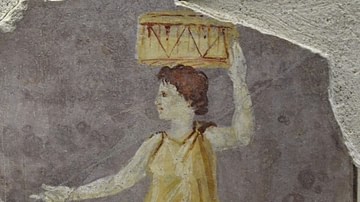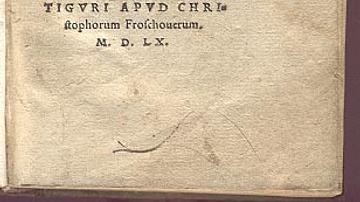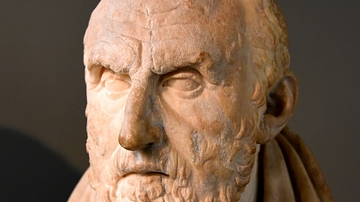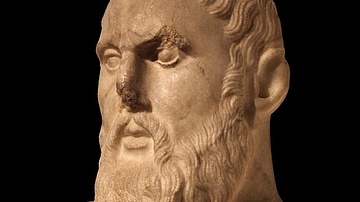Search
Did you mean: Ostracism?
Search Results

Definition
Pyrrho
Pyrrho of Elis (l. c. 360 to c. 270 BCE) was a Greek skeptic philosopher credited with founding the school of Pyrrhonism which taught that one must resist making judgments or stating conclusions because sense perception did not correlate...

Definition
Alexandra David-Néel
Alexandra David-Néel (l. 1868-1969) was a world traveler, writer, and Buddhist spiritualist who wrote over 30 books on her journeys which took her 18,641.136 miles (30,000 km) around the world on foot or by various conveyances. Her works...

Definition
Hipparchia of Maroneia
Hipparchia of Maroneia (l. c. 350-280 BCE) was a Cynic philosopher who rejected her upper-class life to live her beliefs and share her values on the streets of ancient Athens. She was the wife of the Cynic Crates of Thebes (l. c. 360-280...

Definition
De Officiis
De Officiis is a treatise written by Marcus Tullius Cicero (106 – 43 BCE), Roman statesman and orator, in the form of a letter to his son just after the death of Julius Caesar in 44 BCE. Strongly influenced by stoicism, De Officiis is divided...

Definition
Cyrenaics
The Cyrenaics were a philosophical school of thought founded c. 4th century BCE by Aristippus of Cyrene (l. c. 435-356 BCE) who taught that sensual pleasure was the highest good and only worthwhile pursuit in life. Known as the first hedonistic...

Image
Chrysippus
Chrysippus (281/77 - 208/4 BCE) developed the Stoic school of philosophy founded in Athens around 280 BCE by Zeno. Roman copy of a lost Greek original of the late 3rd or 2nd century BCE. (The British Museum, London)

Article
Trial and Execution of Louis XVI
The trial and execution of King Louis XVI of France (r. 1774-1792) was one of the most impactful events of the French Revolution (1789-99). In December 1792, the former king, now referred to as Citizen Louis Capet, was tried and found guilty...

Article
Heraclitus: Life Is Flux
Heraclitus of Ephesus (l. c. 500 BCE) famously claimed that “life is flux” and, although he seems to have thought this observation would be clear to all, people have continued to resist change from his time to the present day. Heraclitus...

Article
The Monastic Movement: Origins & Purposes
In 313 CE, Constantine the Great (272 – 337 CE) ended the sporadic-yet-terrifying Christian persecutions under the Roman Empire with his “Edict of Milan,” and brought the Christian church under imperial protection. Not surprisingly, public...

Article
The Life and Thought of Zeno of Citium in Diogenes Laertius
Zeno of Citium (c. 336 – 265 BCE) was the founder of the Stoic School of philosophy in Athens, which taught that the Logos (Universal Reason) was the greatest good in life and living in accordance with reason was the meaning of life. He was...